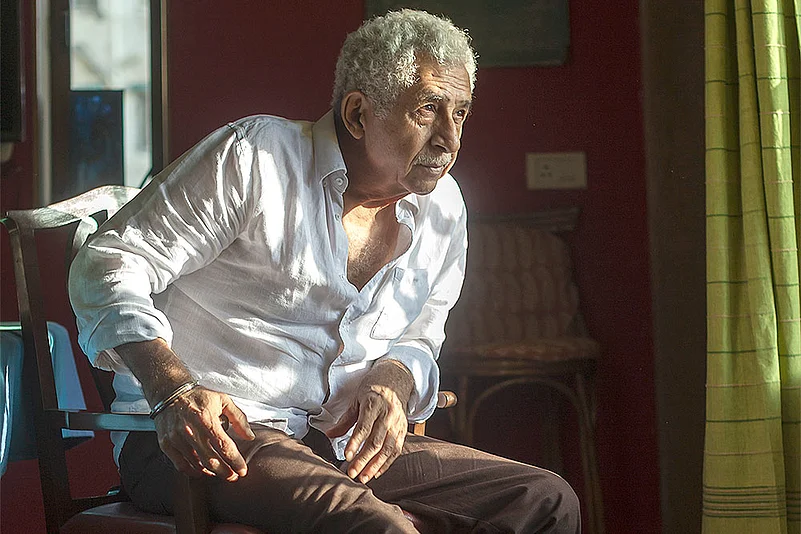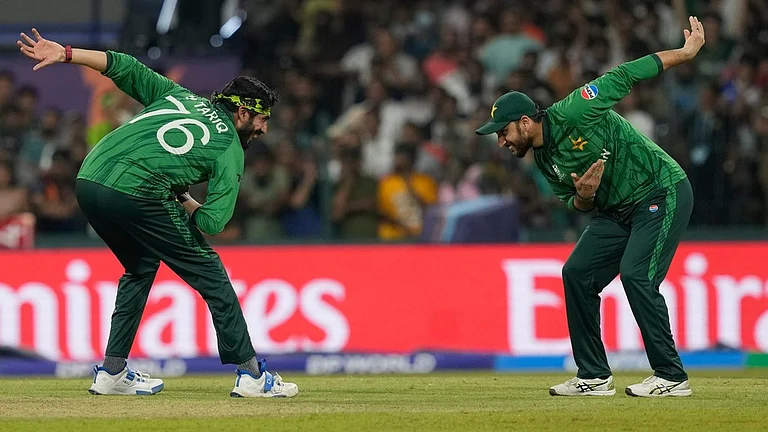Not your typical film industry veteran, it’s hard to catch Naseeruddin Shah in a conversational mood when it comes to interviews. Thankfully, some ‘right questions’ click with the actor par excellence. Here, Shah, who was last seen in the recently released Hope Aur Hum, talks to Prachi Pinglay-Plumber about the pretensions in erstwhile parallel cinema, what attracts him to some roles and not others, what he enjoys about present day movies and his unending love for Ismat Chugtai’s work, which he has staged time and again. Excerpts:
What draws to you a particular script or a story, especially when you are working with new directors, a new team?
It’s hard to say. I get drawn to different things at different times. I think it’s the heart in a script that really draws me in. A lot of scripts are written with an eye on what will be popular or what will titillate or what this actor can do well. I don’t think those kinds of scripts ever work. The ones I have done, the ones that have resonated with people, were scripts which were written from the heart, out of a genuine need to tell those stories. Whether you talk of an Aakrosh (1980), a Manthan (1976) or a Masoom (1983), these are the films that succeed. If I sense that the idea matters to the writer in a script, it immediately grabs me. If the writer is just trying to be clever, you can sense that too.
Do you see any similarities between the present alt-cinema movement and parallel cinema of the 70s and 80s? How are/were they different from commercial films?
I find this distinction bad. There are good films and bad films. There are films which are made in Rs 3.5 lakh and are very successful, like Chakra (1981) or Aakrosh. And there are films made in Rs 300 crore which are awful. Every film is a commercial film in my definition because it costs so much to make one. You can’t make a film for your personal satisfaction. That is why I detest the cinema of people like Mani Kaul. Firstly, it gives good cinema a bad name. Everyone equates good cinema with boring shots and boring films—where a character takes 10 minutes to walk down a corridor and still nothing happens at the end of the shot. Those films tried to be cool and fashionable by dispensing with drama, which in my opinion is absolute non-sense. You can’t dispense with drama in cinema. As Hitchcock said, cinema is real life without the dull parts.
What do you think of the digital revolution in cinema—online video platforms, short films, web series?
Yeah, it is fantastic. There are so many opportunities for filmmakers to test out their craft. They don’t have a producer sitting on their head, they don’t have to accommodate stars or think of budgets, they can make a film on their beliefs. I have acted in two or three such films and I really enjoyed it. It is very tough to make a short film. It’s like writing a short story, which is tougher than writing a novel. You can’t afford to faff around, you can’t indulge, you have to get to the point. This film, Café Interior Night, I did with Naveen (Kasturia), was shot in one night. Since the director was sorted, he knew what he was doing.
You are a writer and you’ve also directed; when you play different characters, do you get involved with those aspects of filmmaking as well?
I bring what I can to it. I personify the character. I try to look at it from the director’s point of view, which is a lesson I learnt after a few knocks—that you have to play the part as it is written and not as how you see it in your head. For example, Junoon (1978), one of my early films, is a wonderful film, but I hate my performance in it. I absolutely hate it. It’s still talked about, but only because of the energy, the acting is dreadful. It’s over the top and more than necessary and I played it like that against the wishes of the director because I just wanted to be the most powerful character in that film. I was an immature kid then, not even 26 or 27. So outdoing and outshining everyone was my desire, which is a foolish way. But I feel I had to go through that phase. And everyone needs to, in order to realise how futile it is. You shouldn’t be afraid of making a fool of yourself. Actors, who are afraid to make a fool of themselves will never be good actors.
You have written about learning acting at NSD and then unlearning it at FTII. What was it about NSD that didn’t click?
What pissed me off about NSD was their insistence on doing theatre only in Hindi. There were students from Marathi, Oriya, Manipuri, Malayalam, Bengali and Tamilian backgrounds and they were all asked to perform in Hindi or Urdu. Why can’t three Marathi students get together and do a play in Marathi? This is the National School of Drama, surely not the Hindi School of Drama. But this was Alkazi’s diktat and that’s why we ended up doing ghastly translations of Shakespeare, Moliere, Pinter and Chekov. Ghastly translations! I don’t like translations anyway. They never do justice to the original. The only purpose they serve is to put the work on record for those who don’t know that language.

I made no sense of the acting classes there. I was also at an age when I felt I knew everything—I was 20 when I joined. I felt I had all the answers and had nothing to learn. I believed I was the greatest actor in the world. So that’s also a reason why I didn’t learn much, but then I also look back on the way how acting was taught to us then. It was all the superficial elements—how to stand, how to catch the light. I can’t say it gave me nothing. It gave me confidence and a great deal of experience of performing on the stage, and nothing matches experience. It got me thinking. I was exposed to other forms of theatre, classical music, serious cinema, sculpture and painting. So it gave me a great deal, but an understanding of acting happened later, not at the NSD.
You often talk about importance of rehearsals, consistent rehearsals. How do you look at rehearsals and the element of spontaneity in acting, for both films and theatre?
It’s as simple as this. What made Sachin Tendulkar such a great player? And how did an equally talented player, let’s not take names, someone without that sense of discipline or commitment, do in life? If you ask Sachin why he practices every day, he will laugh and tell you that without practice, how could he be any good? It’s the same with acting.
The trouble is, most actors, young actors in particular, don’t know what they should do. And there is no one who can show them the right direction. An aspiring singer or dancer knows what disciplines he has to master. There are teachers who can guide them, rules they can adhere to. Actors don’t know where to look. I get asked this question by so many student actors—what do we do, how do we ready ourselves?
What do you tell them?
I tell them: decide for yourself the two most important things you are going to need as an actor, depending on what kind of actor you want to become. Some kids want to become an Amitabh Bachchan, some want to become Ranveer Singh, some Aamir Khan and some may want to be Naseeruddin Shah. Once it’s decided, identify the two things that you will definitely need. If you want to be Ranveer Singh, you need a very sexy physique and a huge amount of energy. He is bouncing off the walls and it’s great. If you want to be a Bachchan, you’d need the diction and the emotional truth. Whether you will be cast or not is not in your hand, you have to work on what is. Looking after your voice and your body is most important, so just start with that.
For an actor, how important is it to be aware and responsive to what is going on around him or her, in the world, in our society?
(Laughs) Actors are not interested in the rest of the world. Acting is the most insular profession in the world. It’s self-indulgent. It’s no way for a grown-up to earn a living. But it is great fun. That’s why we do it. Jokes apart, it depends on what kind of actor you want to become, where do your dreams end. If your dreams are limited to doing couple of hit films and getting an air conditioned flat and a fancy car, then that’s one thing. But if your dreams are bigger than that, and by that I don’t mean you become an international star, but if your dreams are that of a journey, of achieving something which might be of value to others, it’s another zone. Making a hit film is of no value to anyone else except yourself. So yes, if your aspirations are bigger, then you need to be aware, but if your aspirations are to see yourself on the cover of Stardust, then you have different priorities.
You work a lot with the younger generation of actors, directors…
I really admire this younger generation. I really do. These kids have gone beyond what we chaps did. They have been exposed to more, they are savvier. They get to see all kinds of cinema from around the world. We had to struggle so much. They lead a much more intense life than we did and their understanding of acting is better than that of our generation. It is a leap. It happens with succeeding generations and, maybe, the next generation will finally get there, reaching a stage where watching acting in our films won’t be downright embarrassing.
Your fascination with Ismat Chugtai’s work continues with your latest presentation on her life and her essays—Aurat!Aurat!!Aurat!!!. How do you go about staging prose? The last piece, Sone Ka Anda, is quite heavy.
Yeah. Even people who know Urdu find this piece difficult. Firstly, the language and the imagery are very complex. One has to really read into the story in order to appreciate it. And what it is talking about is also…it turns the knife in the wound. Men, in particular, don’t like it.
She wrote about things in 1940s which still hold true. Another story in the series, Shauhar Ki Khatir, is about Ismat’s experience of travelling in a train alone, where everyone is interested in knowing whether she is married. Even now if a girl is travelling alone, the first thing people want to find out is if she is married or not.
Some stories are not possible to stage. Manto’s Toba Tek Singh is one of the greatest short stories ever written, but it cannot be staged. The description of that character, the eponymous protagonist, is such that no actor can play it without tons of make-up, and tons of make-up will just look like tons of make-up.
Before this, I tried another set of stories of Ismat. But I read them for three months and abandoned the idea, because I realised they cannot be staged. One of them is called Hindustan Chod Do about an English officer who falls in love with a prostitute and after the Quit India movement, resigns and doesn’t leave. Just hangs around and dies on the streets. It’s a heart breaking story. But you can’t stage it, you can only tell such a story. I always stick to the text because what a great writer can describe something in one sentence, you need 10 min of film time to establish.


























